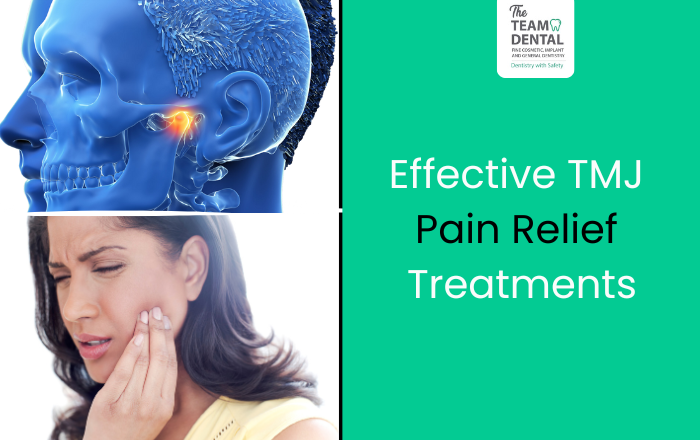Waking up with jaw pain, headaches, or a clicking sound every time you chew can be frustrating and exhausting. If you’re struggling with TMJ pain, you’re not alone. The temporomandibular joint (TMJ) connects your jaw to your skull and plays a key role in everyday activities like talking, eating, and even smiling. When this joint becomes irritated or inflamed, it can lead to discomfort that affects your daily life.
The good news is there are several ways to get TMJ pain relief, from simple home remedies to professional dental treatments. This guide will walk you through what causes TMJ pain, what you can do at home, and when it might be time to seek help from a dentist.
Understanding TMJ Pain
What is TMJ? The temporomandibular joint, or TMJ, acts like a sliding hinge that connects your jawbone to your skull. It allows your jaw to move up and down and side to side, which makes it possible to talk, chew, and yawn comfortably. Problems in this joint or the surrounding muscles can lead to TMJ disorder, causing pain and restricted movement. Common Symptoms of TMJ Disorder Some of the most common signs of TMJ issues include:- Jaw pain or tenderness
- Clicking, popping, or grinding sounds when opening or closing your mouth
- Headaches or earaches
- Difficulty chewing or discomfort while eating
- Facial swelling or stiffness
- Teeth grinding or clenching (often during sleep)
- Stress, which can tighten jaw muscles
- Jaw injuries or trauma
- Misaligned bite or dental issues
- Arthritis or joint inflammation
Effective Home Remedies for TMJ Pain Relief
1. Simple Jaw Exercises Gentle exercises can help reduce tension and improve jaw movement. Some examples include slowly opening and closing your mouth, stretching your jaw side to side, and moving your jaw forward and back. Always start slowly and stop if you feel pain. 2. Hot and Cold Therapy Applying a warm compress can relax tight jaw muscles, while an ice pack can reduce swelling and numb discomfort. A good approach is 10–15 minutes with heat or cold several times a day as needed. 3. Stress Reduction Techniques Stress can worsen TMJ pain by causing jaw clenching. Simple relaxation techniques like deep breathing, meditation, or light yoga can help ease tension in your jaw and reduce discomfort. 4. Over-the-Counter Pain Relief Non-prescription pain relievers, such as ibuprofen or acetaminophen, can help manage temporary TMJ pain. Follow the instructions on the label and consult your doctor if you have any medical conditions.Professional Treatments for TMJ Disorders
Dental Approaches A dentist can help by adjusting your bite or recommending a bite guard to prevent teeth grinding. Orthodontic treatments may also help if misaligned teeth are contributing to TMJ issues. Physical Therapy and Massage Therapists can guide you through exercises that stretch and strengthen jaw muscles, helping reduce pain and improve movement. Massage techniques can also relieve muscle tension around the jaw and face. Medications and Injections For persistent pain, a dentist or doctor may suggest medications like muscle relaxants or corticosteroid injections to reduce inflammation and muscle tightness. Surgical Options Surgery is rarely needed but may be considered if other treatments do not relieve severe TMJ issues. This could involve minor joint procedures or, in rare cases, jaw surgery. Lifestyle Changes That Support TMJ Pain Relief- Simple daily habits can make a big difference in managing TMJ pain:
- Avoid hard, chewy, or sticky foods that strain the jaw
- Keep good posture, especially while sitting at a desk
- Reduce caffeine and alcohol that can increase muscle tension
- Get enough sleep and find ways to manage stress

